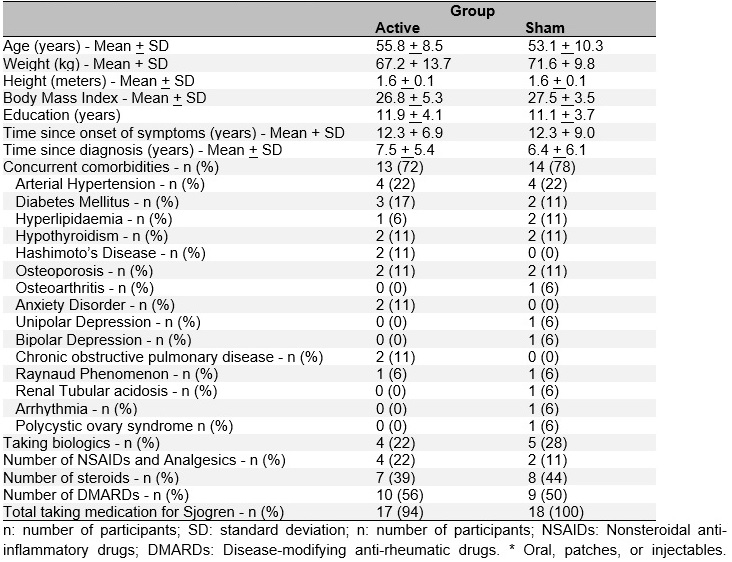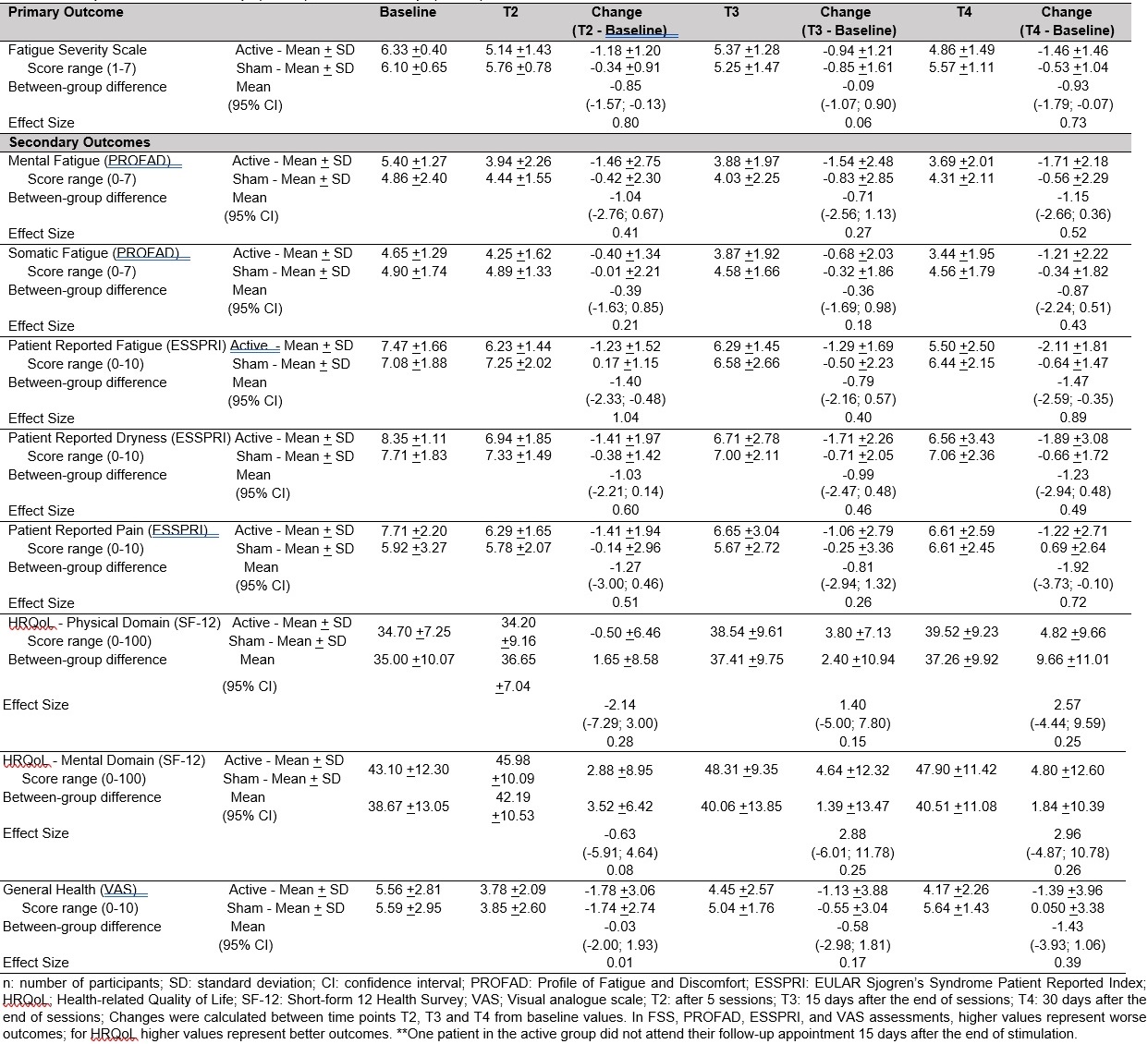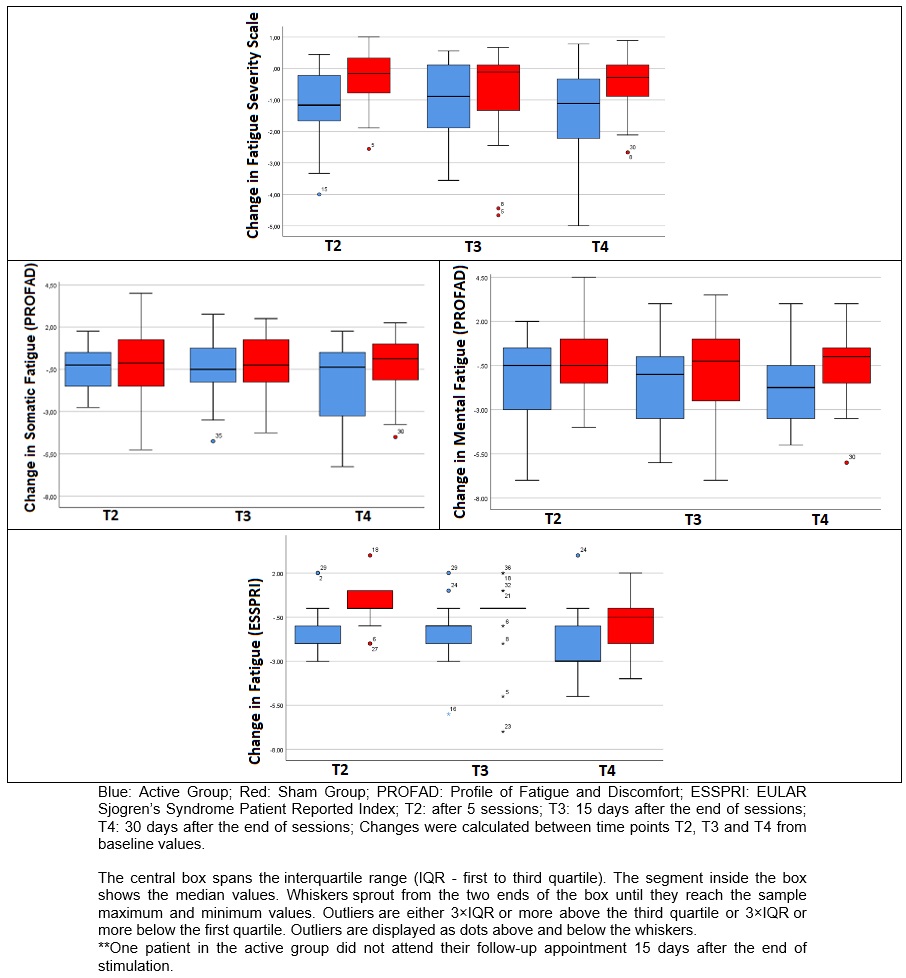Session Information
Date: Sunday, November 8, 2020
Title: Sjögren’s Syndrome Poster
Session Type: Poster Session C
Session Time: 9:00AM-11:00AM
Background/Purpose: Transcranial direct-current stimulation (tDCS) has shown promise to decrease fatigue. However, it has never been examined in primary Sjogren Syndrome (pSS). We aimed to assess the effect of a tDCS protocol on fatigue in patients with pSS.
Methods: This is a parallel, double-blind pilot study (NCT04119128). Women aged 18-65 years, with pSS, on stable pharmacological therapy, with complaints of fatigue for at least three months, and with scores > 5 on Fatigue Severity Scale (FSS) were included. We randomized 36 participants to receive five consecutive or sham tDCS sessions, with an intensity of 2mA, for 20 minutes/day.
Results: After five tDCS sessions, fatigue severity assessed by the FSS (primary outcome) demonstrated a mean group difference of -0.85 [95% confidence interval (CI) -1.57, -0.13; effect size 0.80] favoring the active group. The active group presented significantly greater reductions in fatigue as measured by the EULAR Sjögren’s Syndrome Patient Reported Index after five tDCS sessions [mean group difference: 1.40; 95%CI -2.33, -0.48; effect size 1.04]. Although there were no between-group differences in the secondary outcomes of sleep, mood and anxiety, within-group comparisons evidenced a small but significant difference in the active group for depression and sleep. There were no significant cortisol changes. All reported adverse events were mild and transitory.
Conclusion: tDCS seems to be safe and reduce fatigue in pSS. Given that tDCS treatment may have a differential effect on mood and sleep but not on cortisol levels, the dorsolateral prefrontal-affective network may mediate tDCS effects on fatigue.
 Table 1. Baseline demographics and clinical characteristics of participants. Active Group (n=18); Sham Group (n=18)
Table 1. Baseline demographics and clinical characteristics of participants. Active Group (n=18); Sham Group (n=18)
 Table 2. Primary and secondary outcomes at each time point, change scores from baseline, and group comparison of change scores at each time point. Active Group (n=18); Sham Group (n=18)
Table 2. Primary and secondary outcomes at each time point, change scores from baseline, and group comparison of change scores at each time point. Active Group (n=18); Sham Group (n=18)
 Figure 1. Box-plots presenting changes in Fatigue Severity Scale, somatic fatigue, mental fatigue and patient self-reported fatigue. Active Group (n=18); Sham Group (n=18).
Figure 1. Box-plots presenting changes in Fatigue Severity Scale, somatic fatigue, mental fatigue and patient self-reported fatigue. Active Group (n=18); Sham Group (n=18).
To cite this abstract in AMA style:
Pinto A, Piva S, Vieira A, Gomes S, Rocha A, Tavares D, Santana M, Carlesso C, Andriolo A, Santos F, Fregni F, Trevisani V. Transcranial Direct Current Stimulation for Fatigue in Patients with Sjogren’s Syndrome: A Randomized, Double-blind Pilot Study [abstract]. Arthritis Rheumatol. 2020; 72 (suppl 10). https://acrabstracts.org/abstract/transcranial-direct-current-stimulation-for-fatigue-in-patients-with-sjogrens-syndrome-a-randomized-double-blind-pilot-study/. Accessed .« Back to ACR Convergence 2020
ACR Meeting Abstracts - https://acrabstracts.org/abstract/transcranial-direct-current-stimulation-for-fatigue-in-patients-with-sjogrens-syndrome-a-randomized-double-blind-pilot-study/
